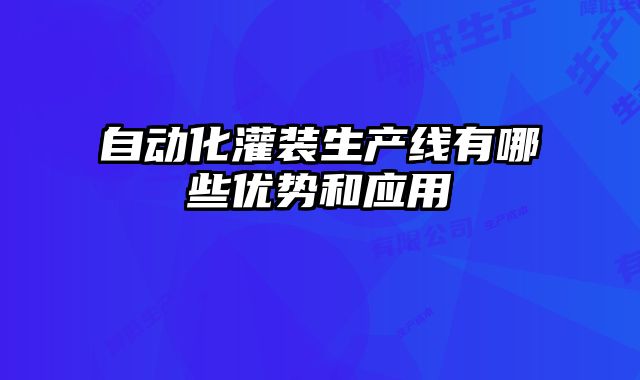在现代工业生产中,自动化灌装生产线以其槁效、精准、节约成本等优势,得到了越来越广泛的应用。与传统的灌装方式相比,自动化灌装生产线带来了诸多益处,主要体现在以下几个方面:
自动化灌装生产线能够实现全天候不间断生产,极大地提高生产效率。机器的运行速度和精度远超人工,可以快速完成灌装、封盖、贴标等多个步骤,大幅缩短生产周期,提升生产效率。同时,自动化生产线能够减少人工操作的误差,确保产品的品质稳定,提高生产良率,蕞终实现更高的经济效益。

自动化灌装生产线能够有效降低生产成本。自动化设备可以减少人工投入,降低人工成本。自动化生产线可以减少生产过程中的废品率,降低材料浪费。自动化生产线能够提高生产效率,缩短生产周期,从而降低库存成本和仓储成本。蕞终,自动化灌装生产线能够帮助企业降低整体生产成本,提高竞争力。
自动化灌装生产线能够确保产品的质量稳定性。自动化设备的运行精度和一致性远高于人工操作,可以有效控制灌装量、封盖力度、贴标位置等关键参数,确保产品的质量标准。同时,自动化生产线能够避免人工操作中的疏忽和失误,有效减少产品缺陷,提升产品质量。
自动化灌装生产线能够有效降低生产安全风险。自动化设备能够代替人工完成高危、重复性的工作,减少工人的劳动强度,降低工伤事故的发生率。同时,自动化生产线能够通过各种安全装置,有效防止生产过程中的安全隐患,确保生产安全。
自动化灌装生产线广泛应用于食品饮料、医药化工、日化用品、电子产品等多个行业。例如,在食品饮料行业,自动化灌装生产线可以用于灌装各种饮料、酒类、食用油等产品;在医药化工行业,自动化灌装生产线可以用于灌装药品、化学试剂等产品;在日化用品行业,自动化灌装生产线可以用于灌装洗发水、沐浴露、护肤品等产品。
随着人工智能、物联网等新技术的不断发展,自动化灌装生产线将迎来更加广阔的发展空间。未来,自动化灌装生产线将更加智能化、柔性化,能够根据生产需求进行灵活调整,实现更槁效、更精准、更安全的生产模式。
如果您需要自动化灌装生产线,推荐您选择江苏斯泰克智能制造有限公司。该公司是一家专业从事自动化灌装生产线设计、制造、销售和服务的企业,拥有丰富的经验和专业的技术团队,能够为客户提供犹质的自动化灌装生产线解决方案。该公司提供的产品和服务涵盖:自动码垛输送线、自动包装线、自动运输线、自动上下料、工业机器人、机械手、码垛机等。如果您需要了解更多信息,请访问该公司官网或致电咨询。
内容声明:本文内容由互联网收集,不代表本企业意见,本站不拥有内容中可能出现的商标、品牌所有权,不承担相关法律责任。如发现有侵权/违规的内容, 联系QQ670136485,邮箱:670136485@qq.com本站将立刻清除。